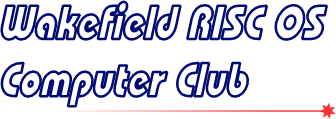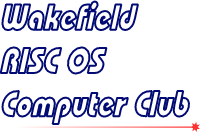Meeting: A Beeb and RISC OS Pot-Pourri
This was a pot-pourri of topics, including a nostalgic look at “Heraldry” and some visual demonstrations of alphabetic sort routines with Rick Sterry, followed by Steve Bass talking about Beeb emulation, and Peter Richmond with some RISC OS hints & tips.
Report by Peter Richmond
The March meeting had two speakers on a linked theme of old BBC software. The first was Rick Sterry, who started the evening by looking at some programs written many years ago on a BBC both by himself and by a former Club member and treasurer, the late Brian Smith. Rick had found these programs while clearing out his mother’s BBC, which she had been using for almost twenty-five years.
Micro archaeology
Rick started by showing Brian’s program on Heraldry, using the Club’s RisCube as a PC and running the Windows-based BBC emulator BeebEm on it. This loads an image file of the original program disc, and runs software at approximately BBC speeds in BBC screen modes. Rick could easily demonstrate the heraldry program – which gave a history of how the various patterns on the shields were created, and even let you create your own. Rick did comment that the programming wasn’t as elegant as it could have been (probably like mine!) by having a look at the listing, since it was written in BASIC. Another of Brian’s titles was a database of pubs around Wakefield, which listed what ales they kept – sadly, a copy of this has not been found.
Rick then went on to relate how, when he first bought his BBC in the early days, although there was a word-processor available, there wasn’t really a card index or database program. His solution was to ‘adjust’ one that had been written for the Commodore PET, which had a similar set of BASIC instructions also and used a 6502 processor – which was the same as the BBC.
Eventually though, he bit the bullet and wrote a program of his own! As part of this writing, he wanted to be able to sort names alphabetically, and then went on to look at different ways of doing sorts. These different types of sorts were demonstrated by programs he had written in BBC BASIC for Windows. Rick started by demonstrating the Bubble sort, and showed how inefficient it was, which was followed by the more efficient Shell sort, and finally by the even more efficient Quick sort. This also showed off some of the features of BBC BASIC for Windows, which is a very capable implementation of the language for the PC.
Data conservation
Steve Bass then took over from Rick with his talk and demonstration of BBC Micro emulation and image files, which used two of his own computers: a PCPro and a three-slice RiscPC with a 5.25" floppy disc in the third slice. The image files in the title of Steve’s talk were, of course, what Rick had been using to access the Heraldry files in BeebEm.
Steve had started looking at image files and associated utilities as a result of a request received by Rick in an email: to convert a program written on a BBC Micro so that it could be run under Windows for the original author to show his grandchildren and let them play it! It sounded interesting (and challenging), so Steve had said that he would have a go – knowing of course that it would be on a floppy and that it would need to run under emulation on a PC. Simples! Of course it wasn’t, but during his journey Steve found a lot out about converting disc images, formats, emulators and the like – until he could finally make a CD to be used with an emulator.
Steve started by showing us part of his ‘computing room’, including a BBC Master which had been re-housed into a larger case so that it could take both 3.5" and 3" disc drives along with an external 5.25" drive. On this, he used a program called MBCopy to transfer files from the DFS disc as sent to Rick on to an ADFS disc which could be read on more modern hardware.
Unfortunately it wasn’t that simple, as one of the files had a full stop at the end of the file name – this proved to be quite problematical as ADFS didn’t like it. Steve then tried DiscCopy to make a copy directly on to a DOS-formatted 3.5" disc. This also didn’t work as easily as might have been expected, and in the end it was necessary to remove the full stop using a sector editor on the disc catalogue.
Disc emulation
The original files on the disc then had to be put in to a disc image file (or ‘SSD file’) so that an emulator could read them as if on a real disc. At this point Steve contacted fellow Club member Jonathan Harston who had some expertise in this area. Finally, between them, they managed to get the original program on to a CD in a format suitable for use with BeebEm on the PC.
To prove this, Steve then ran the program in question: a pirate-themed text adventure with a map of a ‘treasure island’ better known to most of us for its puffins.
Steve thanked both Joel Rowbottom and Peter Richmond for their previous talks on emulators and how BBCs can be modified today, as well as Jonathan Harston for his work on the disc reading software which was used extensively.
Since there was quite an interest in the room about his software, Jonathan then demonstrated the tools – which had been given some ‘upgrades’ as a result of working with Steve on the project. Jonathan’s software seems to be able to read just about any obscure disk format, which he ably demonstrated using a CP/M and mixed mode 3.5" disc which he had brought with him.







